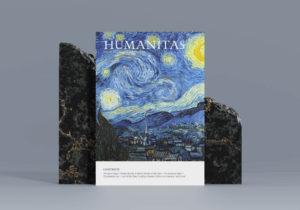

Ever wonder where the word ‘Orwellian’ comes from? It’s coined from the British writer George Orwell. If you’ve ever heard phrases like, “Big Brother is watching you,” “thought police”, “newspeak,” “doublethink”, or “Room 101”, they are all from his book, Nineteen Eighty-Four, which was published 75 years ago today. Here are some things you may not know about George Orwell and the writing of his famous dystopian novel.
Nineteen Eighty-Four is a dark, cautionary tale about the nation of Oceania, a totalitarian state where the Party controls every aspect of life. People are constantly monitored through ‘telescreens’, (a mix between television, microphone and security camera). Images of the Party leader, known as ‘Big Brother’, are everywhere. The Party controls the record of history, language and even people’s thoughts.
There are four government ministries and Orwell summarises them like this: “The Ministry of Peace concerns itself with war, the Ministry of Truth with lies, the Ministry of Love with torture and the Ministry of Plenty with starvation.” (Part II, Chapter IX)
The main character of the story is Winston Smith, a low-ranking member of the party who rewrites newspaper editorials at the Ministry of Truth to suit whatever version of truth the Party dictates.
Did you know? Senate House in London, where Orwell’s wife worked at the Ministry of Information, inspired his description of the outside of the Ministry of Love in Nineteen Eighty-Four. There was also a real ‘Room 101’ at the BBC, where Orwell worked during the Second World War, although it certainly wasn’t as nightmarish as the room in the novel!
Orwell borrowed elements from different tyrannical regimes in creating the world of Nineteen Eighty-Four. The Party slogan “2 + 2 = 5” came from the Soviet Union’s “five-year plan” for national development starting in 1928. The activity inside the Ministry of Love and the work of the Thought Police were likely inspired by the NKVD in the Soviet Union.
Did you know? Before it was published, Orwell was wracked with indecision about the title for his novel. For a while he was going to call it, The Last Man in Europe. And it wasn’t always to be set in 1984 either—Orwell considered basing the story in both 1980 and 1982.
Orwell desperately needed some solitude to finish writing his novel, so he bought a small cottage on the remote Hebridean island of Jura. He was also dying from tuberculosis. The final pages of Nineteen Eighty-Four were written in between bouts of hospitalisation, and Orwell died in January 1950, just 7 months after the novel was published.
Although Orwell had seen success as a broadcaster, journalist, nonfiction writer, and as the author of Animal Farm, he was only 46 when he died and never got to witness the incredible influence that his most popular work would have on the world.
Did you know? A film adaptation of Nineteen Eighty-Four was made in 1984! Directed by Michael Radford, the film was nominated for a BAFTA Award for Best Art Direction and won two Evening Standard British Film Awards for Best Film and Best Actor.




